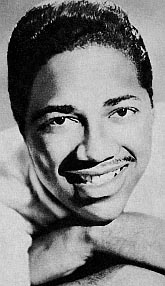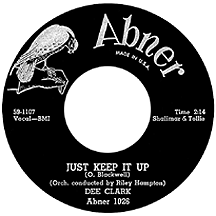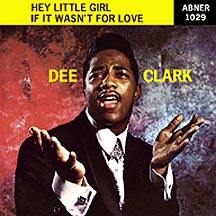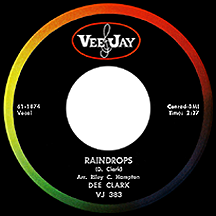DEE CLARK
Back in the days when even established stars had to drive to and from peformance dates, Dee Clark and Phil Upchurch were making the 800-mile journey from New York City back home to Chicago. The monotonous trip became more challenging by a particularly unrelenting rainstorm, and as Upchurch drove, Clark began to construct a song to the beat of the car's windshield wipers. By the time they reached Chicago he had finished writing the song and later, after his moving performance had been committed to tape complete with sound effects of thunder and rain, it became one of the biggest hits of 1961, a radio mainstay for years to come. "Raindrops" was the crowning achievement of Clark's career, guaranteeing his place in music history.
Born Delecta Clark, he barely recalled his birthplace of Blytheville, Arkansas, having moved to the west side of Chicago in 1941 when he was three years old. Growing up with a love of music through his mother's gospel singing in church, with her encouragment he began performing with his friends from school, Ronnie Strong and Sammy McGrier. Perfecting the "hambone" moves popular in the early 1950s, slapping their thighs and chests, and stomping in time to music (the history of the dance known earlier as "juba" traces back at least a couple of centuries and was adapted by minstrel shows during the 1800s), the boys gained enough notice around Chicago that Red Saunders recorded with them, calling the young trio The Hambone Kids. The jubilant sound that resulted, "Hambone" (the single also featuring Red's regular vocalist Dolores Hawkins), was a top 30 hit in March 1952.
Attending Marshall High School in Chicago, Delecta began singing with a group called The Goldentones around 1953 and after disc jockey Herb "Kool Gent" Kent took over management they recorded for Gary, Indiana's Vee-Jay label as The Kool Gents, releasing "This is the Night" in 1956 (a different song than the '57 hit by The Valiants) and a follow-up, afterwards going the novelty route as The Delegates, nominating rock-and-rollers to White House positions on the VJ single "The Convention," released during the 1956 election season. Moving to the Falcon label, he went solo as Dee Clark and by this time his voice had matured into a sound similar to Clyde McPhatter's. "Seven Nights" found its inspiration in McPhatter's hit "Seven Days," but at this point "Hambone" remained his only hit record.
Clark had begun writing his own songs, and he clearly had a knack for it. Near the end of 1958, his composition "Nobody But You" was released on Abner Records (named after Vee-Jay exec Ewart Abner, it replaced Falcon, though the label's slightly menacing trademark image of the bird of prey remained). Still very much in the McPhatter mode, it hit big, going top 40 nationally and reaching the top ten on the rhythm and blues charts, easily outpacing the Saunders hit he'd sung on more than six years earlier. What seemed like a long road from child performer to hit artist wasn't such a bad thing...he had just turned 20 when the song took to the airwaves. His early efforts for Abner featured the flute as a prominent instrument, something Berry Gordy would utilize starting a few months later on a string of hits for Marv Johnson, another singer in the vein of McPhatter and Clark.
Follow-up singles were equally successful; Otis Blackwell's "Just Keep it Up" made the top 20 and the third hit, "Hey Little Girl," another Blackwell tune, employed a Bo Diddley beat and once again landed Dee in the top 20, becoming his hottest R&B chart hit, reaching number two. His version of Bobby Parker's "Blues Get Off My Shoulder" was an effective, moody performance that contrasted the earlier singles and may have failed to connect with listeners for that reason, but when its flip side "How About That," composed by Doris Payne (better known as singer-songwriter Doris Troy, who had a hit in 1963 with "Just One Look") with Frank Augustus, hit the charts at the end of the year (becoming his fourth top 40 pop and top ten R&B hit in a row), Clark had established himself as one of the top recording acts of 1959.
His 1960 releases continued to hit the charts, but with less impact. "At My Front Door" was a vigorous but overly big band-sounding remake of the 1955 Vee-Jay hit by The El Doradoes (written by John Moore and Abner). "You're Looking Good" marked his return to Vee-Jay, its lively string arrangement in keeping with the atmosphere of some of 1960's other summer hits. With a song Clark released at the beginning of 1961 featuring backing vocals by The Dells, "Your Friends" (its theme similar to the Jimmy Cox-penned classic of the 1920s, "Nobody Knows You When You're Down and Out," which had been successfully revived by Nina Simone a few months earlier), he was back in the top 40 and on the verge of his greatest success. "Raindrops," with its soul-searching vocals by Clark (and guitar by Upchurch), was an instant smash in the spring of '61, blasting to the top of radio playlists across the nation. Moving quickly up the national charts, it peaked at number two at the end of June, kept out of the number one spot by Gary (U.S.) Bonds' "Quarter to Three."

Poised to enjoy many more years of success, he frustratingly found it difficult to capitalize on the momentum of his million-selling hit. "Don't Walk Away From Me" was a strong follow-up, yet radio programmers rejected it. "I'm Going Back to School" had a decent chart run in '62 but its novelty aspect distanced him from where he'd been with more ambitious earlier efforts. After "Shook Up Over You" and a couple of other singles in 1963, Dee left Vee-Jay and signed with Constellation, a new record company Ewart Abner had formed in partnership with Bunky Shepard. His first 45 for the label covered a subject he hadn't yet tackled (except to a degree on that first single with Red Saunders): now he was a dancin' man, giving detailed instructions on how to do the "crossfire" (lifted from the title of a hit by The Orlons) on the Don Covay-Horace Ott-penned "Crossfire Time," which briefly appeared on the charts. Successive Constellation singles were mostly met with indifference. A songwriting collaboration with Sam Cooke, "T.C.B.," was his last song to get any notice (in 1965, a few month's after Cooke's death).
Dee Clark enjoyed at least a decade of popularity, with a hot three year stretch from '58 to '61, and spent the rest of the 1960s and part of the next decade infrequently releasing 45s on Columbia, Wand, Liberty and others, making his living mainly through live appearances. His lifestyle in the later 1970s and '80s is unclear, but after a stroke in 1987 he was partially paralyzed, not yet 50 years old. He lived the rest of his life in poverty and died in 1990 at age 52, an early and inglorious end, unfortunately not an uncommon story among music acts. I choose to remember him for his gifted vocal ability and terrific run of hits, particularly "Raindrops"...a beautiful two minutes and 37 seconds.
NOTABLE SINGLES:
- Hambone - 1952
by Red Saunders and his Orchestra with
Dolores Hawkins and the Hambone Kids - This is the Night - 1956
by the Kool Gents - The Convention - 1956
by the Delegates - Nobody But You - 1958
- Just Keep It Up - 1959
- Hey Little Girl - 1959
- How About That /
Blues Get Off My Shoulder - 1959 - At My Front Door - 1960
- You're Looking Good - 1960
- Your Friends /
Because I Love You - 1961 - Raindrops - 1961
- Don't Walk Away From Me - 1961
- I'm Going Back to School - 1962
- Shook Up Over You - 1963
- Crossfire Time - 1963
- Heartbreak - 1964
- T.C.B. - 1965




